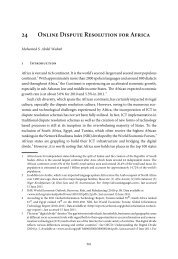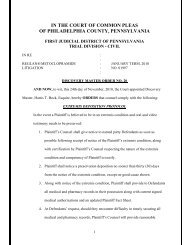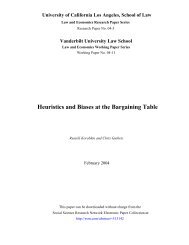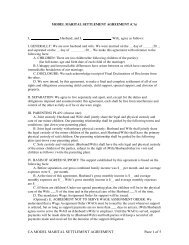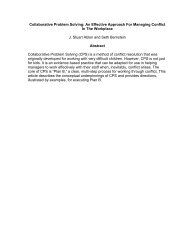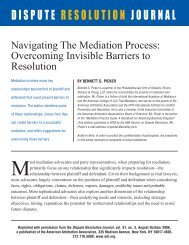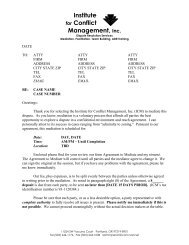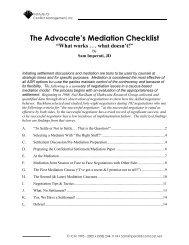17 e-Mediation - Mediate.com
17 e-Mediation - Mediate.com
17 e-Mediation - Mediate.com
Create successful ePaper yourself
Turn your PDF publications into a flip-book with our unique Google optimized e-Paper software.
Noam Ebner<br />
This flurry of <strong>com</strong>missions and papers have been augmented by service providers who<br />
have drafted their own set of guidelines, whether presenting them as codes of practice or<br />
just as part of their “about us” section.<br />
Much of the discussion of ethics pertains to the wider field of ODR, so I will not expand<br />
on it here. However, I will make a few <strong>com</strong>ments regarding mediation-specific issues.<br />
Most standards of practice for online mediation have been modeled on traditional<br />
mediation practice standards. The one area receiving attention outside of this model is<br />
that of technical standards. Service providers often included the quality of their platform<br />
and its robustness, as well as the technological proficiency of their mediators, as part of<br />
their standards of practice. 99 However, face-to-face standards need to be tweaked to<br />
ac<strong>com</strong>modate the online environment and online practice methods. For example, the<br />
service provider model described in this chapter necessitates two layers of impartiality:<br />
The service provider must be impartial, not only the mediator. As an example of dealing<br />
with this issue, I will note that the now-defunct Web<strong>Mediate</strong> clearly stated that not only<br />
was it an independent service, but that as a business it did not accept investments from<br />
insurance <strong>com</strong>panies or other businesses using the <strong>com</strong>pany to resolve disputes. 100 Other<br />
service providers took this issue to heart, as well. 101<br />
While there is not, as of yet, any agreed-upon or institutionalized standards to speak<br />
of, recent thinking might be reflected in NCTDR’s code of practice. 102 One important<br />
section of that code pertains to e-mediation as it voices preference to consensual processes:<br />
Online Dispute Resolution schemes should encourage parties, whenever<br />
appropriate, to resolve their disputes using consensual processes, particularly<br />
when the restoration of the social links amongst disputants is of paramount<br />
importance, such as in family disputes. Consensual processes however should<br />
not be imposed against the will of the parties.<br />
A recent paper by Jo DeMars, Susan Naus Exxon, Kimberly Kovach and Colin Rule 103<br />
reflects some of the areas requiring discussion regarding ODR ethics. One important issue<br />
relating to mediation in particular reflects a trend noticeable in the debate on ADR ethics<br />
in general: abandoning the primacy given to neutrality and impartiality as guiding professional<br />
and ethical beacons, and instead striving to maintain balance between parties.<br />
99 Ponte & Cavenagh (2005). See, for example, SquareTrade’s standards of practice cited on p. 64.<br />
100 Id.<br />
101 Beal (1999).<br />
102 NCTDR, Online Dispute Resolution Standards of Practice, 2009. Available at<br />
,<br />
last accessed 28 April 2011.<br />
103 J. DeMars et al., “Virtual Virtues: Ethical Considerations for an Online Dispute Resolution (ODR) Practice”,<br />
Dispute Resolution Magazine, Fall 2010.<br />
396


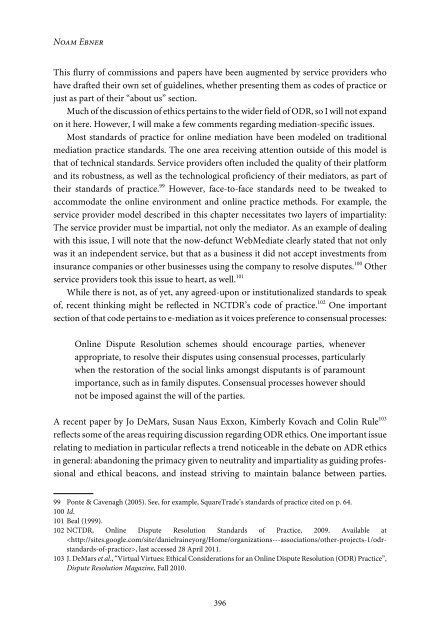
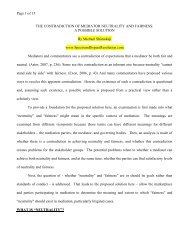
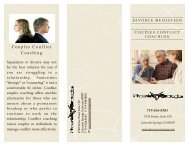
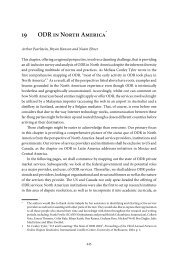
![Settlement Agreement Form [Agreement] - Mediate.com](https://img.yumpu.com/50682143/1/190x245/settlement-agreement-form-agreement-mediatecom.jpg?quality=85)

